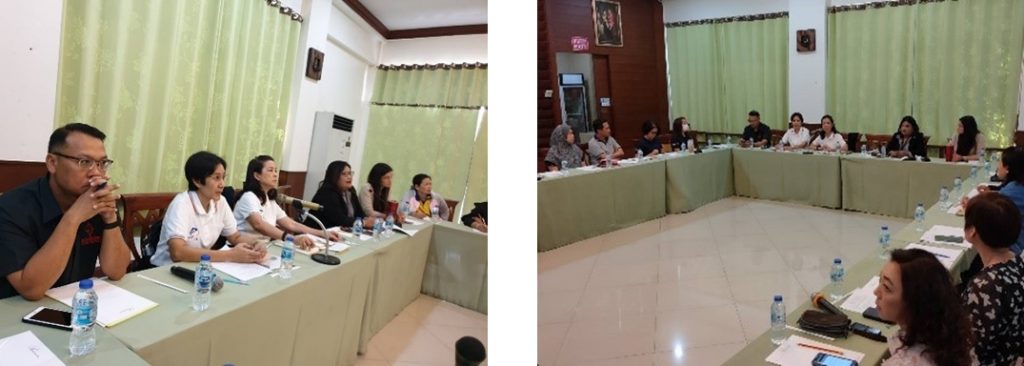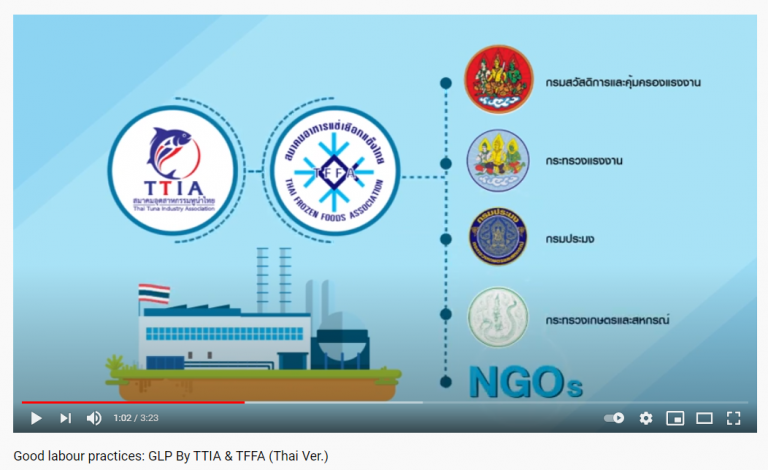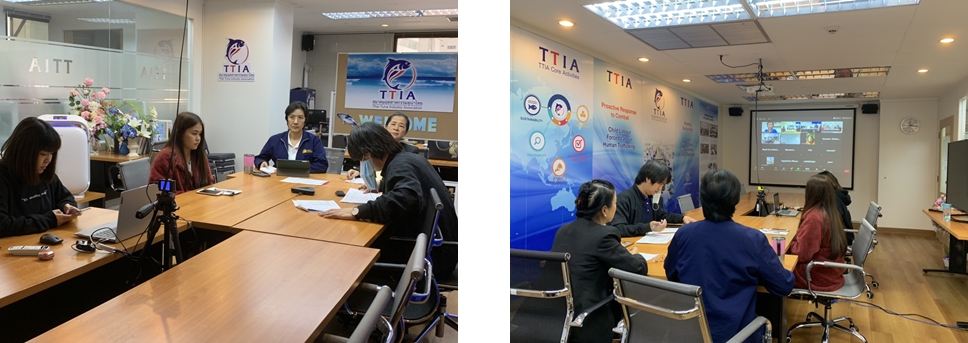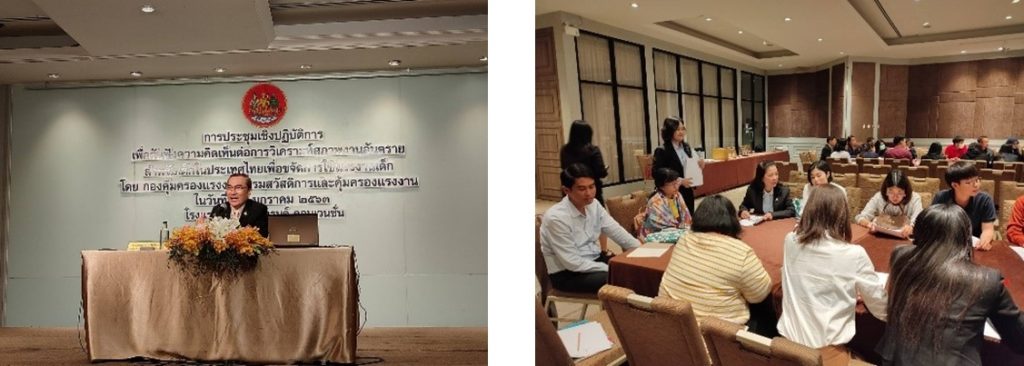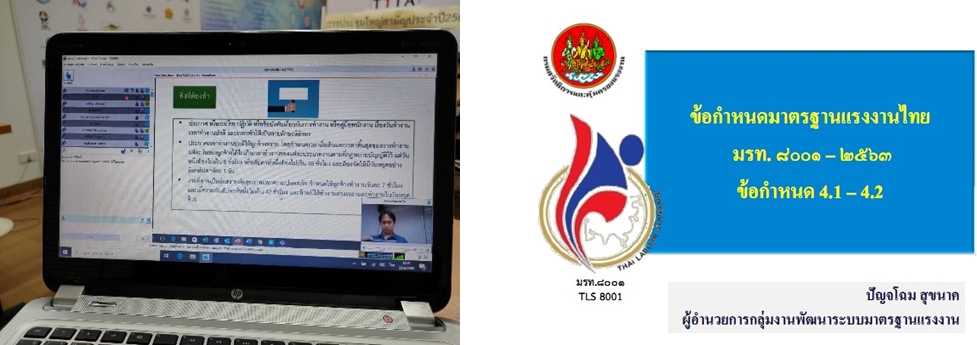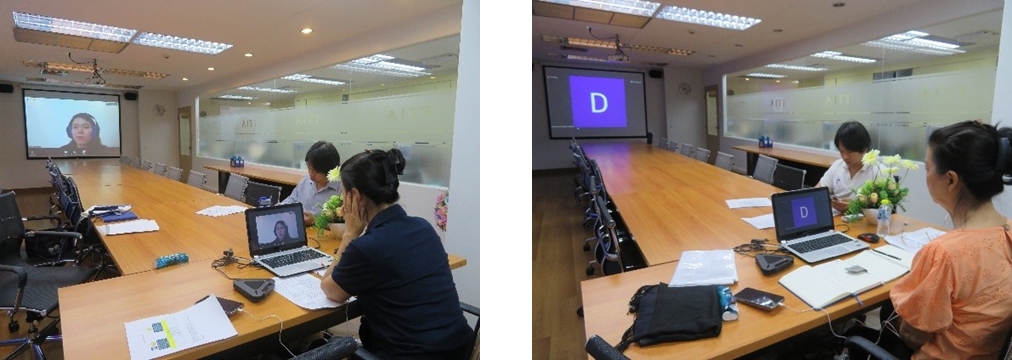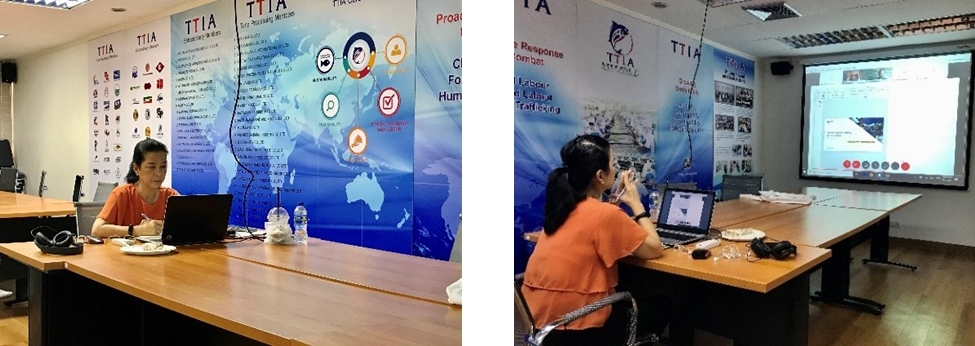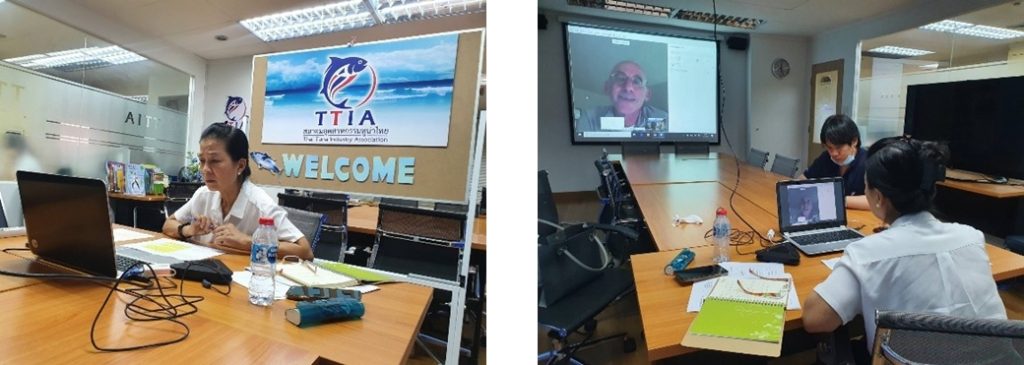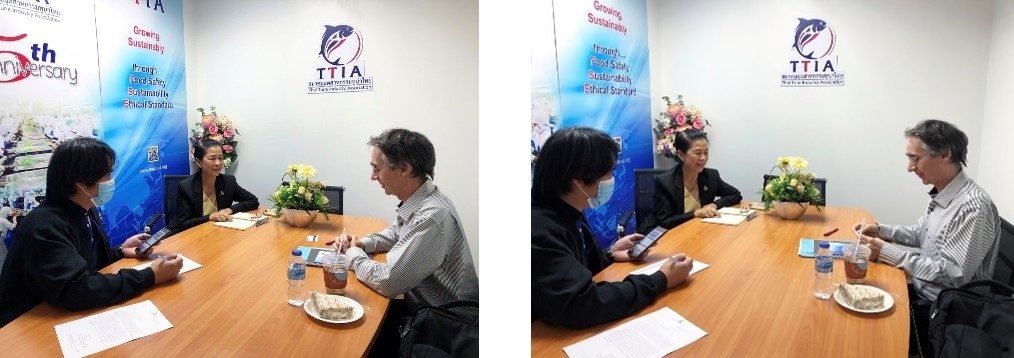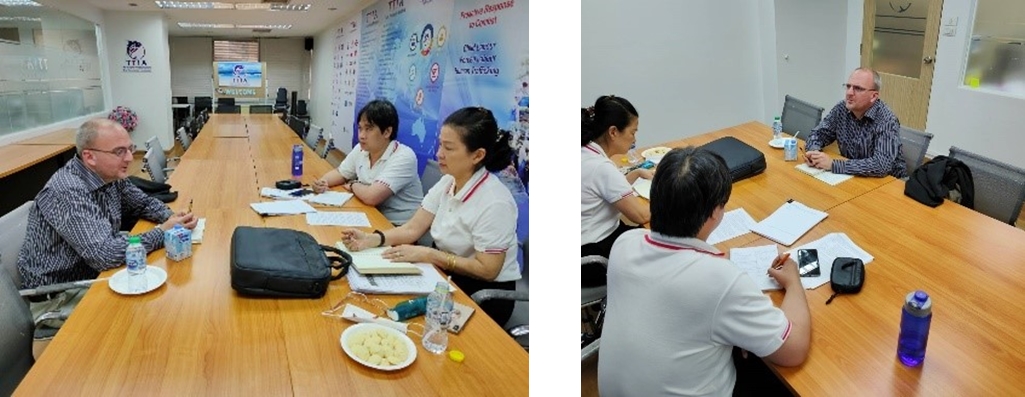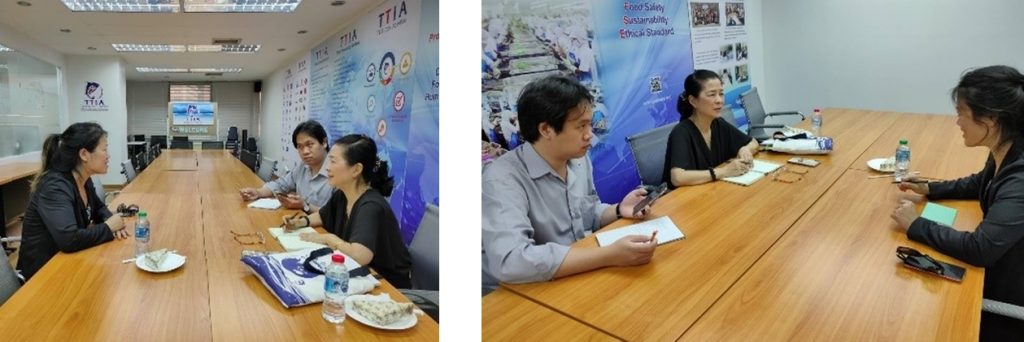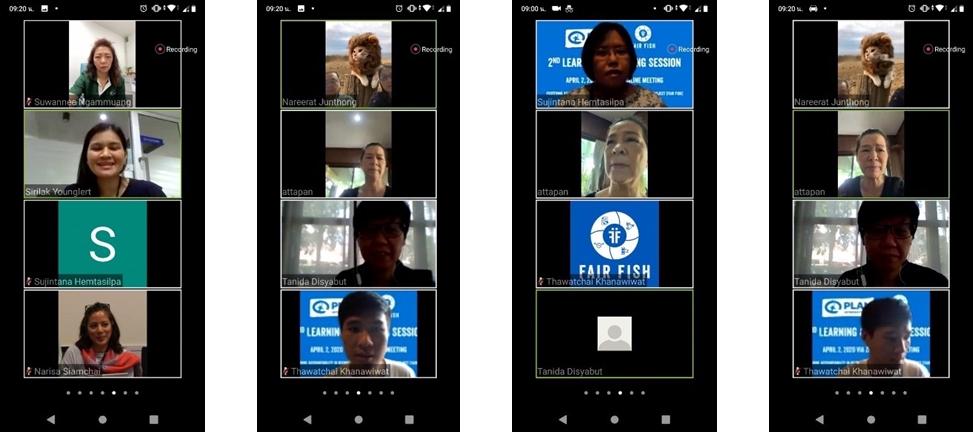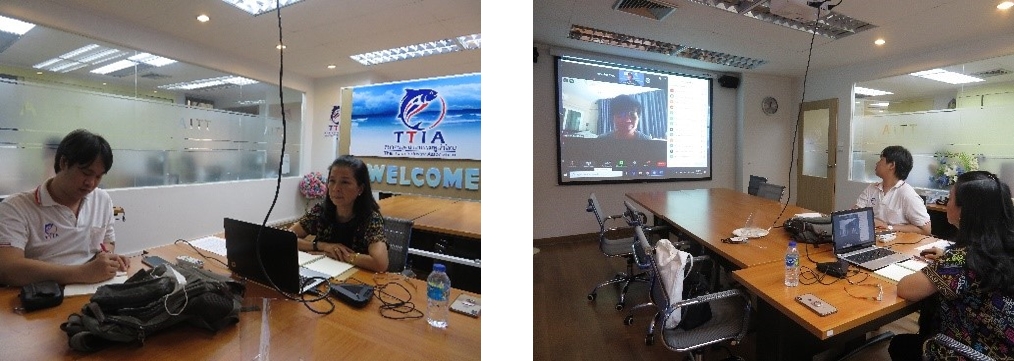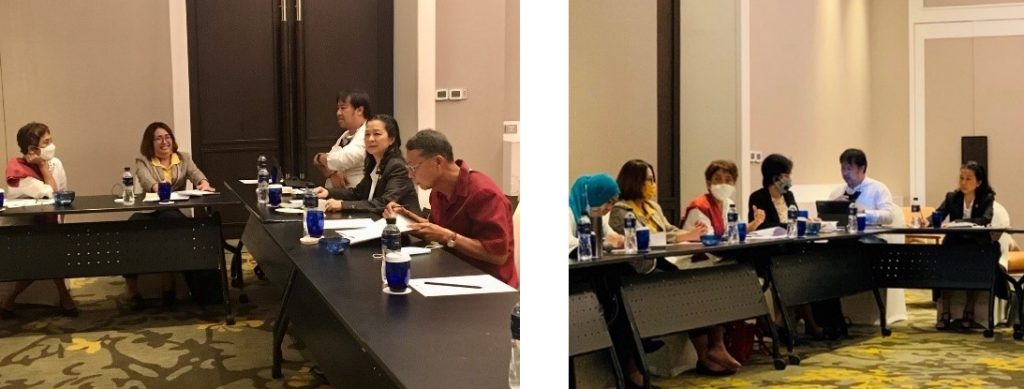TTIA’S EFFORT TO ADDRESS CHILD LABOUR FORCE LABOUR AND TRAFFICKING IN PERSONS 2020
During the year 2020, Thailand has continued to put efforts to address child labour, force labour and slavery in fishing industry. As a result, the European Commission lifted “yellow card” from Thailand for its actions against illegal fishing in early 2019 – which delisted Thailand from the group of “warned countries” as recognition of its progress in tackling illegal, unreported and unregulated fishing – seeing the country’s efforts on improve the law and enhance law enforcement. In addition, Thailand ratifies ILO’s Work in Fishing Convention No. 188, and enact the Protection of Workers in Fishing Industry of 2019.
The Royal Thai Government also adopted other measures to address force labour and trafficking in persons. As a result, the U.S. State Department’s Trafficking in Persons (TIP) Report 2020 has maintained Thailand’s ranking at Tier 2 for three consecutive years. This is because the Thai government, with collaboration of stakeholders, have made significant progress in its efforts to address human trafficking. The Thai Government also aim to move its TIP ranking up to Tier 1 in 2021. In addition, Thailand also aimed to withdrawal at least one of the four Thai products from the USA’s blacklist of potential use of force labour by 2012 – 2013 (sugarcane, apparel, shrimp, and fish).
There is no child labour and force labour in the production process of Thailand’s tuna industry. More over, TTIA has been committed to promote the appliance of the association’s ethical codes of conduct on labour among its members’ supply chain.
The Report of TTIA’s Effort to Address Child labour, Force Labour and Trafficking in Persons 2020 is structured into 5 Parts as follow:
- Part 1: Imports of Frozen Whole Round Tuna
- Part 2: Controlling engagement in ethical labour practice of supply chain
- Part 3: Implementation of ILO-GLP in the Thai Tuna Industry
- Part 4: Promotion of ethical labour practice among key supply chain
- Part 5: Collaboration with Government, International Organizations and NGOs working on Labour issues
Part 1: Imports of Frozen Whole Round Tuna
Majority of frozen Whole Round Tuna in Thai tuna industry is imported from the World – at around 700,000 tons per year. The major fleets supplying raw material to Thai processors are Taiwan, Micronesia south Korea, and south Korea – as demonstrated in the following table:
Table : Thai Imports of Frozen Whole Round Tuna from the World in 2018-2020
Source: www.moc.go.th, December 2020, Prepared by Thai Tuna Industry Association
Part 2: Controlling engagement in ethical labour practice of supply chain
In order to prevent the use of forced and slave labour in TTIA members’ factories and their supply, the Association has the following policies and measures as follow:
2.1 TTIA’ policies on ethical practice towards workers
One of the key activities that TTIA has done on labour issues is the policy commitment on Ethical Code of Conduct. Companies applying to TTIA members are required to submit their written commitment in compliance with TTIA’s Ethical Labour Practice – Code of Conduct, mostly based on Thai law. It covers 8 items as follows:
- No Child Labour: No workers under the age of 18 years old is engaged or employed in the processing plants. Upon recruiting, all applicants shall provide a government-issued passport, Identity card and/or work permit for verifying age and legality to work respectively.
- No Forced and Compulsory Labour: Workers are not required to pay deposits or recruitment fee to the company. The company shall not lodge passport, Identity card and/or work permit belonging to the workers. The company shall not withhold any part of workers’ salary and benefits.
- No Discrimination: The company shall not allow any behavior indicating harassment, discrimination or bullying. Education and training on the fundamental of human rights shall be conducted for all personnel concerning the supervision of workers and security practice. The company shall have in place the mechanism and grievance handling to ensure fair treatment of workers.
- Freedom of Association and Right to Collective Bargaining: As permitted by Thai law, the company shall respect the rights of workers for freedom of association and collective bargaining.
- Health and Safety: Occupational health and safety of workers shall be of the utmost concern for the company. At minimum, all legal requirements of related laws must be fulfilled. They include to the provision of necessary personal protective equipment at the employer’s expenses, first aid treatment, and assistance for follow-up medical treatment.
- Disciplinary Practices: The company shall not engage in or tolerate the use of corporal punishment, mental or physical coercion, or verbal abuse of workers. Deductions from wages as a disciplinary measure are not allowed.
- Remuneration: The minimum daily wage shall be fully paid according to Thai law to every workers. Overtime work shall be reimbursed at a premium rate and paid leave shall be granted as defined by Thai Law.
- Welfare and Benefit: Social security payments are contributed by both workers and company – in accordance with Thai Labour Law – which ensure all workers are eligible for national health care coverage. The company shall register every workers to this scheme from the first day of employment. For the period where the national health care coverage is not yet in effect, the company shall provide adequate medical treatment and expenses to assist any work-related injuries and illnesses.
2.2 Promoting supply chain engagement in ethical labour practice
The Association policy stipulated that members apply the ethical code of conduct both upstream and downstream of the supply chain in order to align to the association’s code, as reflected in the following flow chart.
Chart: Supply Chain of Thai Tuna Industry Towards Ethical Standard
2.3 TTIA ADDITIONAL REGULATIONS FOR TTIA MEMBERSHIP
In 2016, TTIA stipulated new criteria for its members to pass the audit of Dolphin Safe Program from EII, and to participate in Good Labour Practice (GLP) Programme to ensure that its members comply with international labour standards and social responsibility. Details are as follow:
- The company shall provide a document clarifying its commitment to comply with TTIA’s following policies:
- Food Safety Policy
- IUU Fishing Policy and Sustainability Policy
- Ethical Code of Conduct
- Ordinary and extra-ordinary members with tuna produces need to pass the audit of Dolphin Safe Program from EII
- Ordinary members need to pass the audit of Good Manufacturing Practice (GMP) and Hazard Analysis and Critical Control Point Critical (HACCP) by government agencies or certified private Organizations
- Ordinary and extra-ordinary members under factory category have to participate in Good Labour Practice (GLP) and shall be visited by TTIA staff at least once a year
- Extra-ordinary members with tuna product trade shall commit that they will by tuna products from TTIA ordinary members only. They should also clarify by providing documents on such purchase to TTIA’s staff when requested
- Ordinary and extra-ordinary members shall comply with policies and resolutions issued by TTIA – both existing and to be issued in the future – for the benefit of Thai tuna industry.
2.4 TTIA’s efforts to promote eradication of trafficking in persons among its members
2.4.1 TTIA’s meetings of its members to share experience and situation on labour related issues
TTIA conducts a bi-monthly meeting among its members to consult and report on labour related issues including new laws and regulations and its enforcement, information of meetings with government and NGOs, new initiatives to address labour related problems that are relevant to members, as well as motivate them to take part on good labour practice activities.
In 2020, TTIA conducted a meeting to establish the Association’s Labour Committee with the purpose of promoting the implementation of labour laws related to human resource matters. Roles and responsibilities of the committee are:
- Conduct meetings to discuss and consider guidelines and laws on labour issues relevant to the industry
- Consider possible impact caused by government’s policies and/or international Organizations on the industry including labour ethic and human rights
- Consider and provide opinion on technical projects and seminars on labour issues
Photo: Meeting of TTIA HR on 28 January 2020 to establish TTIA Labour Committee. Members are four representatives from members:
- Thai Union Co. Ltd. by Ms. Sirilak Yangleart
- Unicord Co. Ltd. By Ms. Wanna Sermsuwannasuk
- Asian Alliance International by Ms. Vijitra Tiangtham
- South East Asian Packaging and Canning by Ms. Worawee Engshuan (also the Secretary General of Thai Pet Food Trade Association -TPFA)
Photo: Meeting of TTIA HR on 28 January 2020 to establish TTIA Labour Committee
Implementation of TTIA GLP Visit
TTIA has promoting the compliance of the Good Laour Practice (GLP) on a regular basis since 2013 with the collaboration of ILO and TFFA. After the Project ended in 2015, TTIA conduct GLP Visits to its members since 2016 to support members to comply with GLP Guideline with a principle to promote good relationship between employers and employees, to monitor result of the implementation of GLP, as well as to promote understanding about GLP for new members.
Conducting TTIA GLP Visit
1) GLP Follow-up Handbook TTIA revised the handbook for GLP follow up visit to be used while conducting visits to factory members. The Handbook was based on the newly revised Handbook “Ship to Shore Rights Good Labour Practices Manual in Thailand’s Seafood Industry” – which was a new version being revised under collaboration of International Labour Organisation and Department of Labour Protection and Welfare with support from Ship to Shore Rights Project funded by EU.
The Handbook was a guideline to conduct GLP Visit among TTIA’s members through the following steps:
- TTIA conducted GLP visit to its members’ factories once a year
- TTIA uses GLP Visit Guideline and results of TTIA GLP Visit from previous year as a baseline to follow up
- Conduct visits to members’ factories and production line
- Conduct interview with employers, randomly interview with employees to collect information on management and life cycle of employees based on GLP guideline, labour laws and operation of welfare committees.
- Request additional documents and evidence for consideration.
- Produce summary report of company’s GLP compliance and overall report on GLP compliance.
In conclusion, participation in GLP activities help the members to be aware of and complying to Good Labour Practice Guideline on a continuing basis. TTIA members are also well informed of emerging situations of labour issues and update laws and regulations. They were equipped with knowledge and skills to solve labour dispute and improve labour protection and welfare in their workplaces.
TTIA members also issue policy to communicate with migrant workers through information materials and training sessions on their rights and responsibilities. They also improve good relationship between employers and workers through welfare committee in the workplace with participation of migrant workers.
PART 3: IMPLEMENTATION OF ILO-GPL IN THE THAI TUNA INDUSTRY
TTIA has been an active partner of the Project Combatting Unacceptable Forms of Work in the Thai Fishing and Seafood Industry, or “Ship to Shore Right” which is a joint project of Ministry of Labour and International Labour Organisation with financial supports from European Union.
Under this Project, TTIA sits in two taskforces with roles and responsibilities as detailed as follow:
Joint Taskforce 1: Legal, Policy and Regulatory Framework and Access to Support Services of Workers and Victims of Labour Abuses is responsible for reviewing legal provisions, policies and advocacy on ratification of international legal tools including ILO Convention No. 188 on Work in Fishing Convention (C. 188), and the ILO’s Forced Labour Protocol (P. 29) as well as other legal provisions on labour rights.
Joint Taskforce 2: Labour Inspection, Enforcement, and Good Labour Practices. The taskforce is responsible for law enforcement, labour inspection, and capacity building of labour inspection officials as well as promoting and supporting private sectors to apply Good Labour Practice (GLP).
For the second taskforce, TTIA joined ILO and TFFA in increasing effectiveness of GLP follow up process to ensure its accountability, as well as to communicate about outcomes of the project to general public. The Project started from 1 January 2018 and already ended in December 2019. The meeting to close down the Project was conducted on 10 March 2020.
Key activities of the Project to Increase Effectiveness of ILO-GLP Compliance can be cited as follow:
- Development of GLP Guideline and evaluation checklist in collaboration with Ministry of labour
- Recruiting experts to conduct follow up visits to TTIA members’ workplaces, and Project Coordinator, as well as develop an annual report on industry overview
- Revisit steps to follow-up and implementation to be more effective
- Advocate for complaint mechanism through Welfare Committee in workplace with participation of migrant workers
- Conduct training session on GLP for factories with participation of buyers
- Conduct training on new edition of GLP Guideline for factories in the Provinces of Songkhla and Samutsakhon
- Established a tri-partite committee (with representatives from government, private sector and NGOs) to oversee the implementation of Good Labour Practice among members on an on-going basis
- Start utilizing the complaint mechanism and remedies
- Evaluate project implementation among members
- Apply GLP with supply chain
- Organise meetings in collaboration of civil society Organizations
- Produce information materials about the project including VDO clips.
In 2020, TTIA and TFFA jointly developed the GLP Annual Report 2019 to report on progress of the associations’ implementation of Good Labour Practice project and submitted to ILO as well as put up on their websites.
VDO clip to promote the GLP project (https://www.youtube.com/watch?v=YZ_6eM294Ww)
GLP Report under the Ship to Shore Rights Project (https://www.thaituna.org/home/ download/activity/GLP%20Annual%20Report%202019%20final%2012062020_TH.pdf)
The last meeting of Ship to Shore Rights Project
The meeting launched Ship to Shore Rights Phase 1 endline research findings on fishers and seafood workers in Thailand conducted by Rapid Asia. It also reported on Thailand’s ratification of the ILO Protocol of 2014 to the Forced Labour Convention, 1930, and the Work in Fishing Convention, 2007 (No.188) as the first country in Asia.
The Royal Thai Government issued a number of legislations to comply with both protocol and convention on a timely manner, as well as implement the GLP in the fishing and seafood industry. Because of these, the Project has been successful in receiving supports from international buyers – which results in the commitment from EU to continue to support the Phase 2 of the Project. The next phase of this project will focus on expanding good practices piloted in Thailand into other countries in the region.
Photo: The last meeting of Ship to Shore Rights Project on 10 March 2020
Monitoring of migrant workers’ recruitment, COVID-19 Prevention Measure, and GLP Visit 2020 to TTIA members
In 2020, ILO developed fair recruitment initiative – General principles and operational guidelines for fair recruitment and definition of recruitment fees and related costs (detail in: https://www.ilo.org/global/topics/labour-migration/publications/WCMS_536755/lang–en/index.htm). TTIA recognises that the tuna industry hires a large number of migrant workers, and it is important to ensure that recruitment of workers is fair and transparent. TTIA developed a checklist on fair recruitment with informal supports from IOM. The checklist was planned to be used among the association’s members. The Association’s key policy is that all members have to recruit workers entering into Thailand through regular and legal channel.
At the same time, TTIA combined the mission to monitor collect information on COVID-19 prevention measures among its members based on a checklist developed by Department of Fishery.
Results of GLP Visit 2020
In 2020, TTIA conducted GLP visits using the newly revised Guideline among 26 out of 27 members (one member stopped producing Tuna fish products) during September to November 2020.
The GLP visits found that 24 out of 26 factories visited or 88% complied with GLP Guideline. The other 3 factories (or 12%) were found to violate the standard on the following issues: Elected welfare committee has not yet established, company regulations on pregnancy leave has not been changed according to the newly enacted law, the practice that HR asking question to applicants if they are pregnant. These issues, however, were corrected right away by the visited companies.
Other issues emerged from the GLP visits include: Using of toilet card in the production line (the company corrected immediately), Professional certificate of the nurse was expired, Information bulletin boards were not updated and the boards did not cover all areas in the factory, payslip was not provided in the language that workers understand, and employment contracts were not copied and given to the workers for keep.
Results of monitoring of recruitment of migrant workers
According to the visits, all member companies recruit new workers based on domestic legal provisions. At present, many companies have tried hard to retain their workers to reduce the recruitment of new workers. The visit found more Thai citizens working in tuna industry than in the past due to economic turndown. This, however, was predicted to cause higher turnover rate. Some members have recruited workers through supports of NGOs such as Issara and MWRN.
Photos showing GLP Visit, and monitoring on Recruitment and Prevention of COVID-19 Measures in 2020
Photo: (left) GLP Visit on Recruitment 2020 at a member’s factory in Songkhla Province on 22 September 2020;
(central) GLP Visit on Recruitment 2020 at a member’s factory in Samutsakhon Province on 6 October 2020;
(right) GLP Visit on Recruitment 2020 at a member’s factory in Suphanburi Province on 16 October 2020
Part 4 Promotion of ethical labour practice among key supply chain companies
On the promotion of ethical labour practice, in 2020, TTIA conducted an online meeting with seven key tuna supply chain companies – include packaging, logos and cooking oil producers – to provide information about GLP and fair recruitment policies so that they have capacity to implement the ethical labour practice on a sustainable basis. This was followed up by GLP visits and monitoring on recruitment and prevention of COVID-19 measures to be conducted during November – December 2020.
Photo: (left) TTIA had an online meeting with key supply chain companies on 11 November 2020.
Results from GLP Visit, and monitoring on Recruitment and Prevention of COVID-19 Measures in 2020 with five extraordinary members and 2 key supply chain companies can be summarised as the following:
- There are minor violations of the standard on the following issues: information bulletin boards were not updated, employment contracts were not copied for workers to keep, and roles and responsibilities of welfare committees are not known to all workers.
- There is no legal violation of the standard
- Findings from recruitment approaches and processes: Companies mainly recruit local workers living in its proximity, there are small number of migrant workers in the production line (less than 100 workers), companies hiring migrant workers paying the cost occurring in recruitment process for workers in advance, where workers can payback to the company later, and most companies do not recruit migrant workers if they can because of high cost for recruitment, difficulties in management and language obstacles.
Photos showing GLP Visit, Recruitment and Prevention of COVID-19 Measures in 2020
with 7 supply chain companies
Photo: (left) GLP Visit on Recruitment 2020 at a member’s factory in Ratchaburi Province on 24 November 2020;
(central) GLP Visit on Recruitment 2020 at a member’s factory in Nakhon Pathom Province on 25 November 2020;
(right) GLP Visit on Recruitment 2020 at a member’s factory in Chachoengsao Province on 26 November 2020
The establishment of TTIA’s Vessel Inspection Guideline for raw materials importers
In 2019, Thailand ratified the ILO’s Work in Fishing Convention No. 188. As a follow up action, the Royal Thai Government enacted a new law – The Labour Protection in Sea Fishery Work B.E.2557 – to comply with the Convention.
Based on the ILO’s Work in Fishing Convention No. 188 and the Labour Protection in Sea Fishery Work B.E. 2557, Tuna industry – which is directly related to the fishing industry as specified in both laws – sees the importance of its role in protecting workers within the industry. TTIA, therefore, conduct a study on principles of the Convention and the law to use as principle ground to develop the association’s guideline on protection of workers on the vessels. After the Guideline was finalised, TTIA brought it for consultation with traders and ship agents to discuss on the possibility of implementation.
TTIA specified topics under the Vessel Inspection Guideline and draft the guideline based on principles complied to national and international standards. The draft was brought up to the consultation of Ministry of Labour and its relevant Department and units, ILO, and TTIA board members. After the Vessel Inspection Guideline was approved, it was uploaded onto TTIA Website. The TTIA Vessel Inspection Guideline was as the following:
TTIA’s Vessel Inspection Guideline
No | Topic | Explanation of the Guideline |
1 | No child labour | Crew working on board a fishing vessel should be of legal age of the flag state. Vessel owners should verify the age of new recruits from their identity documents to ensure that they have legal age for work. |
2 | No forced labour | Crew are on board of their own will and are not forced to work by means of bribery or coercion - including the following - coercive work by threats of life, physical violence, freedom, and property, withholding of identity documents, debt bondage, inception, limit of freedom to travel, confinement, physical and sexual violence, wage withholding, and living and working in exploitative working conditions. Working hours should comply with the law of each state. |
3 | No human trafficking | Crews are not recruited by individuals or legal bodies that are related to human trafficking acts including: the recruitment, transportation, transfer, harbouring or receipt of persons, by means of the threat or use of force or other forms of coercion, of abduction, of fraud, of deception, of the abuse of power especially legal power to force the person to accept the illegal act, and for the purpose of exploitation including slavery or practices similar to slavery and begging. |
4 | Equal treatment | Crew are treated with respect and dignity, and no one is subject to any kind of abuse, harassment, intimidation or inhumane treatment. Discrimination is prohibited and includes but is not limited to, that based on: caste, national origin, ethnicity, religion, age, disability, gender, marital status, sexual orientation, union membership, political affiliation/beliefs, pregnancy, health or disability. There is no harsh or inhumane treatment of crew, including no physical, sexual, verbal, or psychological abuse or harassment, other forms of intimidation. |
5 | Freedom of association and collective bargaining | All workers are free to exercise their right to form and/or join trade unions and to bargain collectively where permitted by law. Crew have the right to operate the power of collective bargaining. |
6 | The recruitment and employment processes are legal | There is an appropriate principle for the acceptable recruitment and employment processes. Crew should be recruited from a legal channel. All crew working on the vessel should have a seaman book. |
7 | A certificate issued for fishing vessel upon meeting the standard on living and working conditions | Have an evidence to prove that the fishing vessel is in good condition and fit for fishing. Food, clean water, toilet, and first-aid kits are available on board. Personal protective equipment and training is provided to all crew. |
8 | Employment contract | On signing contract, employers provide contract written in a language that they understand, and the content of the contract includes at a minimum name of employers, name of employee, starting date, the payment schedule, welfare, and job descriptions. The contract should be made into two copies - each for employer and worker as an evidence for both parties to comply with the agreed employment contracts. A list of the crew should be made and maintained at the workplace. |
9 | Wage payment | Wages are paid to the crew at least once a month. Payment is made on time at location as agreed with crew and on a regular basis. Pay slips (or receipts) are issued to crew. |
10 | Medical checkup and health and medical welfare is provided to crew | Crew members are provided with annual medical checkup and health certification is provided by doctors to ensure that they are healthy and fit for work. Appropriate welfare scheme is provided to crew including medical and health insurance. |
11 | Working hours, day off and paid leaves holidays for all workers are reasonable. | Working hours and rest hours for all workers are provided reasonably. The rights to different types of leaves complies with the law of flag state. |
12 | Fair grievance procedure exists | The procedures for the ending of contracts, grievances and disciplinary actions are conducted fairly and confidentially. Concerns and grievances are addressed without putting at risk of negative repercussions on crew. There is a mechanism that allows crew to report concerns and grievances to other persons than his/her direct supervisors. There is a mechanism to follow up of reported grievance. There is appeal system for unfavorably resolved complaints and disciplinary actions. |
13 | Environmental concerns | All fishing vessels to operate responsibly and in a manner that respects the ecosystem and reduces impacts on the marine environment. |
14 | Business is conducted lawfully and with traceability | Business is conducted lawfully and with integrity. The required management systems and procedures are in place and they comply with the appropriate laws, regulations and conventions. Vessels are transparent about their operations and it is possible to trace the origin of the seafood. Corruption and bribery are prohibited. |
Photo: TTIA conducted a joint meeting with Traders and Ship Agents on 27 August and 30 September 2020.
As a result of the meeting, representatives of traders and Ship Agents agreed to implement TTIA Guideline as a follow up action. It is worth to note that a number of traders have already comply with the Guideline.
Part 5: Collaboration with Government, International Organisations and NGOs working on Labour issues
5.1 Collaboration with Government on anti-human trafficking efforts
TTIA has collaborated with governmental agencies directly and through Thailand’s Chamber of Commerce, the Federation of Thai Industries, Thai Fisheries Producers Coalition, as well as eight Ministries, namely, Ministry of Labour, Ministry Agriculture and Cooperation, Ministry of Commerce, Ministry of Public Health Ministry of Social Development and Human Security, Ministry of Foreign Affairs, Ministry of Interior, and Ministry of Justice. Collaboration has been in the form of meetings and consultations on issues related to labour issues. Key activities include the following:
– TTIA participated in a consultation workshop to consider types of hazardous work conditions for children for the purpose of elimination of child labour at the Miracle Grand Hotel conducted by Department of Labour Protection and Welfare on 24 January 2020.
Photo: TTIA participated in a consultation workshop to consider types of hazardous work conditions for children for the purpose of elimination of child labour on 24 January 2020
– TTIA participated in a consultation meeting on establishing conditions for recruitment of migrant workers for general labour work and shopkeepers at Tian Achakul Meeting room, Ministry of Labour conducted by Department of Labour Protection and Welfare on 20 May 2020.
Photo: TTIA participated in a consultation meeting on establishing conditions for recruitment of migrant workers for general labour work and shopkeepers at Tian Achakul Meeting room, Ministry of Labour on 20 May 2020.
– TTIA participated in a public hearing session on the draft Ministerial Regulation on the protection of Fishing workers B.E….. at the Department of Labour Protection and Welfare on 17 September 2020.
Photo: TTIA participated in a public hearing session on the draft Ministerial Regulation on the Protection of Fishing workers B.E… at the Department of Labour Protection and Welfare on 17 September 2020.
– TTIA consulted with Mr. Peera Chokebooncharoen, Director of the Women and Child Labour Group under the Department of Labour Protection and Welfare and Labour Protection Network on establishing a national committee on the withdrawal of products blacklisted by the USA on 3 November 2020.
Photo: TTIA consulted with Mr. Peera Chokebooncharoen, Director of the Women and Child Labour Group under the Department of Labour Protection and Welfare and Labour Protection Network on establishing a national committee on the withdrawal of products blacklisted by the USA on 3 November 2020.
– TTIA participated in a meeting of sub-committee on monitoring and data collection on the work on prevention and suppression of child labour, force labour in the shrimp, fish, sugarcane and apparel industry (1/2563) at Prof. Nikom Chantaravitoon Meeting Room on 13 November 2020 conducted by Ministry of Labour
Photo: TTIA participated in a meeting of sub-committee on monitoring and data collection on the work on prevention and suppression of child labour, force labour in the shrimp, fish, sugarcane and apparel industry (1/2563)
on 13 November 2020
– TTIA participated in an online seminar on “Legal definitions related to recruitments of workers in fishing industry” presented by Mr. Narongrith Wannaso, action legal expert, Department of Labour protection and Welfare, during 26-27 May 2020 conducted by Ministry of Labour
in an online seminar on “Legal definitions related to recruitments of workers in fishing industry” conducted by Department of Labour protection and Welfare, during 26-27 May 2020
– TTIA attended the training under the Project to raise awareness on Thai Labour Standard 8001-2563 via an online meeting application – CatConferrence conducted by Office of Labour Standard Development, Department of Labour Protection and Welfare on 23 June 2020.
Photo: TTIA attended the training under the Project to raise awareness on Thai Labour Standard 8001-2563 via an online meeting application – CatConferrence conducted by Office of Labour Standard Development, Department of Labour Protection and Welfare on 23 June 2020.
5.2 Collaboration with International Organizations
TTIA has established work relation with international Organizations to encourage its members to apply the principle for fair recruitment of migrant workers based on international standard in their workplaces. Collaboration and consultations include the following:
– TTIA participated in an online meeting of Sea Forum for Fishers Project with focus on the following issues: 1) Harmonizing labour standards in the fishing and seafood industry in SEA 2) Sea Forum for Fisher Working group on Fair recruitment of migrant fishers in and from SEA during 22-23 January 2020.
Photo: TTIA participated in the Sea Forum for Fishers Project online meeting during 22-23 January 2020
– TTIA participated in the Sea Forum for Fishers Project online meeting on Department of Fishery’s efforts on anti-human trafficking and force labour during the pandemic of COVID-19 on 21 May 2020
Photo: TTIA participated in the Sea Forum for Fishers Project online meeting on Department of Fishery’s efforts on anti-human trafficking and force labour during the pandemic of COVID-19
– TTIA took part in a meeting for evaluation of the Sea Forum For Fishers Project via VDO Conference conducted by Dr. Eric Oldsman, the evaluator on 8 July 2020.
Photo: TTIA participated in a meeting for evaluation of the Sea Forum For Fishers Project via VDO Conference conducted by Dr. Eric Oldsman, the evaluator on 8 July 2020
– TTIA participated in a seminar on Covid-19 and the role of the board organized by Pipso and ILO Private Sector on 20 August 2020.
Photo: TTIA participated in a seminar on Covid-19 and the role of the board organized by Pipso and ILO Private Sector
– TTIA joint the government and private sectors’ joint committee on recruitment of migrant workers and participated in the committee’s 2nd meeting (2/2563) on 18 September 2020.
Photo: TTIA participated in the committee’s 2nd meeting (2/2563)
– TTIA gave an interview to Mr. Arnauld de Nadaillac, an evaluator of IOM’s PROMISE Project – which aims to enhance vocational skills for migrant workers and provide knowledge on labour recruitment on 11 November 2020.
Photo: TTIA gave an interview to Mr. Arnauld de Nadaillac, an evaluator of IOM’s PROMISE Project
5.3 Collaboration with non-profit Organizations
TTIA has work with NGOs on the development of ethical practice towards labour within the industry on an ongoing basis. Among other activities, complaints, issues and recommendations raised by workers have been brought up for tri-partite consultations. Some of the activities in collaboration in the year 2020 include the following:
– TTIA and its members participated in a Learning and Sharing Session on “How to recruit migrant workers fairly?” conducted under the USDOL’s funded Fair Fish Project by PLAN International Thailand on 4 February 2020
Photo: TTIA and its members participated in a Learning and Sharing Session on “How to recruit migrant workers fairly?” conducted under the USDOL’s funded Fair Fish Project by PLAN International Thailand
– TTIA had a consultation with Mr. Andy Hall at the TTIA Office on key points for fair labour recruitment on 2 March 2020
Photo: TTIA had a consultation with Mr. Andy Hall at the TTIA Office on key points for fair labour recruitment
– TTIA had a meeting with Ms. MI ZHOU, from ILO Office in Jakarta to discuss on the preparation of the Ship to Shore Rights Project Phase 2 on 3 March 2020
Photo: TTIA had a meeting with Ms. MI ZHOU, from ILO Office in Jakarta to discuss on the preparation
of the Ship to Shore Rights Project Phase 2
– TTIA and its members participated in a Learning and Sharing Session on “Collaboration and joint efforts on fair and responsible recruitment) conducted under the USDOL’s funded Fair Fish Project by PLAN International Thailand on 2 April 2020
Photo: TTIA and its members participated in a Learning and Sharing Session on “Collaboration and joint efforts on fair and responsible recruitment) conducted under the USDOL’s funded Fair Fish Project by PLAN International Thailand
– TTIA consulted with Mar Petcare representative (Ms. Supawadee Chotikayan) to learn about the establishment of Thai Pet Food Association (TPFA) and its policies and implementation on labour related issues on 8 May 2020.
Photo: TTIA consulted with Mar Petcare representative
– TTIA participated in an online meeting on “Risk Assessment on Force Labour” via Zoom Conference App conducted by PLAN International Thailand under the Fair Fish Project on 4 June 2020.
Photo: TTIA participated in an online meeting on “Risk Assessment on Force Labour” via Zoom Conference App conducted by PLAN International Thailand under the Fair Fish Project
– TTIA participated in a seminar on “Direction of migrant labour management and solutions to the shortage of labour in the fishing and seafood industry – especially during COVID-19 Pandemic” at Radison Blu Hotel organized by Migrant Working Group on 31 August 2020
Photo: TTIA participated in a seminar on “Direction of migrant labour management and solutions to the shortage of labour in the fishing and seafood industry – especially during COVID-19 Pandemic” at Radison Blu Hotel organized by Migrant Working Group
– TTIA had a meeting with MWRN to discuss on establishment of welfare committee at the workplace at the TFFA Meeting Room on 30 September 2020
Photo: TTIA had a meeting with MWRN to discuss on establishment of welfare committee at the workplace at the TFFA Meeting Room




